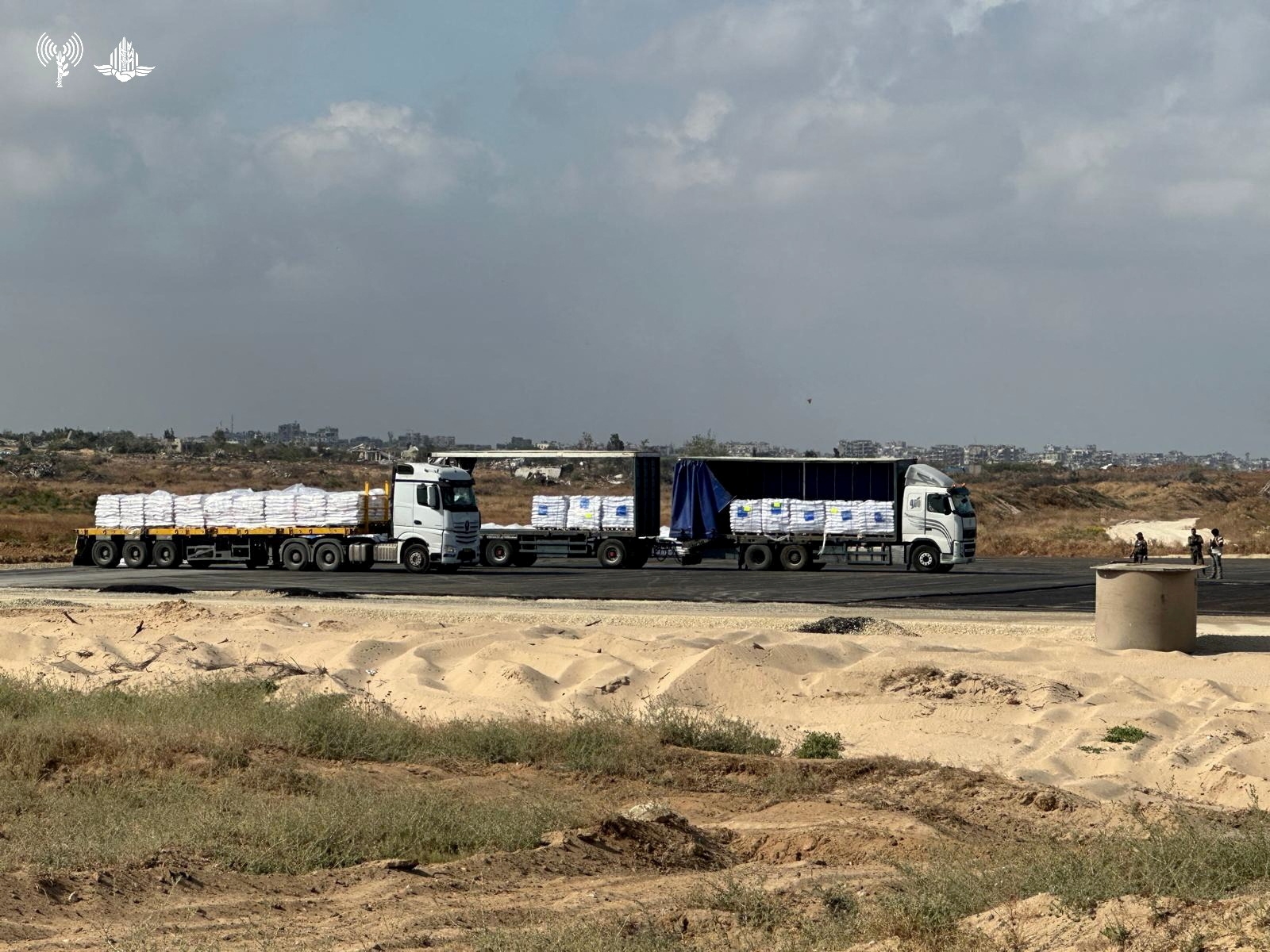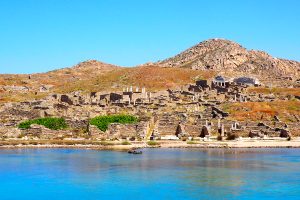Small groups of Israeli protesters have attacked a number of aid trucks headed to Gaza from the West Bank and Israel in recent weeks, complicating efforts by the international community to help the strip’s population of more than two million survive the continuing conflict.
Meanwhile, trucks carrying the first shipment of aid from a temporary pier built by the U.S. military entered the strip on Friday, according to U.S. Central Command, which oversees American military operations in the Middle East.
Humanitarian workers have warned that getting more aid into the strip is critical as most of the population have been forced to leave their homes, and some are on the verge of famine. Aid trucks remain the most efficient way to get aid to Gazans, meaning that maintaining safe and secure land routes is essential.
Some Israelis have organized protests against the delivery of humanitarian aid into the strip throughout the war, including at a southern border crossing with Israel where trucks enter Gaza. But more recent protests have turned violent, with instances of truck drivers getting attacked and vehicles being set on fire.
Such incidents show how resentment has built inside right-wing and more religious settler communities in the occupied West Bank—toward Israeli authorities for allowing aid deliveries into the strip for Palestinian civilians, when hostages remain in the enclave, held by Hamas and other militant groups.

The Israeli military said Friday that it recovered the dead bodies of three Israeli hostages kidnapped from the Nova music festival—Amit Buskila, 28, Shani Louk, 23 (in the photo) and Itzik Gelernter, 57—in a special operation in Gaza on Thursday night.
Pressure in Israel is building through almost daily protests to free the hostages that remain in Gaza. The Israeli military said Friday that it recovered the dead bodies of three Israeli hostages kidnapped from the Nova music festival—Amit Buskila, 28, Shani Louk, 23, and Itzik Gelernter, 57—in a special operation in Gaza on Thursday night. Some 125 of the over 240 hostages taken on Oct. 7 remain in Gaza, according to Israel.
The Israeli military said it received a report Thursday night that dozens of Israeli citizens had attacked an Israeli driver who was wounded and whose truck was set on fire at the Kochav HaShachar junction in the West Bank. It said that three military officers and soldiers were then injured as the military intervened.
In an incident near the Tarqumiyah checkpoint in the West Bank on Monday, protesters unloaded boxes of aid from a truck and threw them on the ground, according to footage by Reuters. Around 70 Palestinian trucks headed toward Gaza were targeted, according to the Hebron Food Trade Association.
Footage captured by Reuters on Tuesday night showed firefighters spraying trucks engulfed in flames near a checkpoint in the southern West Bank town of Beit Awwa. It wasn’t clear whether the trucks were part of the convoy that was attacked a day earlier.
One of the Israeli groups involved in blocking aid trucks is Tzav 9, which has advertised protests via WhatsApp groups, word-of-mouth and Facebook, according to participant Michael Raskas. The Israeli commodities consultant said the rationale behind the demonstrations is the protesters’ belief that Hamas is getting hold of incoming aid.
“To provide aid to our cruel, barbaric enemy in the middle of a war is outrageous. No one is doing anything for our hostages,” he said.
Raskas said demonstrators who have shown up recently come from across the political spectrum and include Israeli settlers. But he said the group’s demonstrations have been peaceful and have only delayed trucks for a few hours at a time.
Israeli authorities have said aid and fuel supplied to Gaza has fallen into Hamas’s hands, while United Nations aid officials say the goods go to Palestinian civilians. The U.S. has said it has seen no evidence to support Israeli claims that aid goes to Hamas.
Earlier this week, U.S. national security adviser Jake Sullivan said the U.S. was looking into how to respond to the aid-convoy attacks, and was raising its concerns with Israeli officials. “It is a total outrage that there are people who are attacking and looting these convoys coming from Jordan going to Gaza to deliver humanitarian assistance,” he said.
The Biden administration imposed sanctions earlier this year against Israeli settlers and people it deems responsible for attacks on Palestinians in the West Bank, as concerns in Washington grew that the Israeli government wasn’t doing enough to curb violence. Attacks by Israeli settlers on Palestinians in the West Bank have doubled since Oct. 7, according to the United Nations.
European Union foreign-policy chief Josep Borrell called this week on Israeli authorities to stop the assaults and hold those responsible to account. “I’m outraged by the repeated & still unchecked attacks perpetrated by Israeli extremists on aid convoys on their way to Gaza, including from Jordan,” he posted on X.
The attacks come as Israeli authorities have severely curtailed humanitarian aid and fuel going into Gaza through Rafah at the same time as the Israeli military has begun to send in its tanks and ground troops. Israel says Rafah is the last stronghold for Hamas and that hostages are being held there.
Only a few hundred thousand liters of fuel have been allowed to enter the Kerem Shalom crossing that borders Israel in the past two weeks, falling short of the roughly 200,000 liters that the U.N. says it needs each day to keep minimal operations afloat. The Rafah border crossing has remained closed after the Israeli military took over the Gaza side last week.
The aid bottleneck has put pressure on the U.S. government to help deliver aid via the temporary pier built by the U.S. military off the coast of Gaza.
Air Force Gen. CQ Brown, Jr., chairman of the Joint Chiefs of Staff, said Thursday that the plan is to start with 25 trucks a day and that the aid would be donated by several countries and humanitarian organizations.
Sonali Korde, assistant to the administrator of USAID’s Bureau for Humanitarian Assistance, said Thursday that the first shipments through the pier would include food bars for 11,000 people, therapeutics for children suffering from severe malnutrition and hygiene kits for 30,000 people.
More than 35,000 Palestinians have been killed in Gaza since the start of the war, most of them civilians, Palestinian officials have said, without specifying how many were combatants. Hamas-led militants on Oct. 7 killed some 1,200 Israelis, most of them civilians, according to Israeli authorities.
While the Israeli military presses its offensive in Rafah, it is also going back into northern parts of the strip that it had withdrawn from. The military killed more than 60 militants in Jabalia, and discovered a militant warehouse for long-range rockets, explosives and other weapons, it said Friday.
Hebron Food Trade Association head Waseem Al-Jabari said that in the Tarqumiyah crossing incident, Israeli settlers attacked the convoy after they were inspected and goods were being transferred to trucks with Israeli license plates. He said Israeli soldiers standing nearby didn’t intervene.
“They destroyed all the goods, assaulted the drivers, and even sabotaged the trucks by burning them and putting sand in the fuel tanks,” he said of the demonstrators. Now, “the drivers are terrified.”
The protesters damaged around 15 trucks, causing about $2 million worth of damage, according to West Bank-based Haulier’s Union.
Israeli demonstrators have also attacked the headquarters of the U.N. agency for Palestinian refugees in Jerusalem. Philippe Lazzarini, commissioner-general of the United Nations Relief and Works Agency, said on X Israeli children and young people attempted to set fire to the building on Tuesday night, the second incident in a week.
The Israeli police didn’t respond to requests for comment about the attacks on aid convoys and Unrwa.
Fatima AbdulKarim and Anat Peled contributed to this article.



